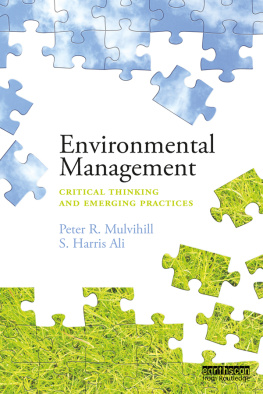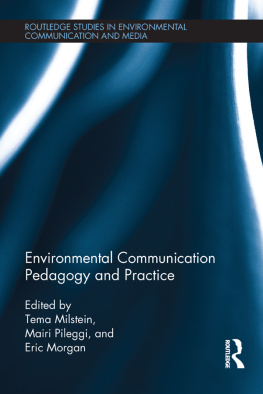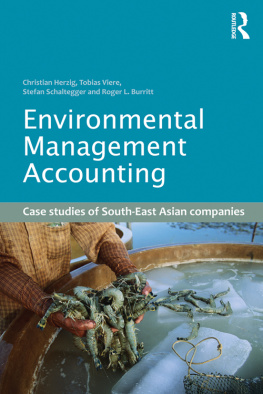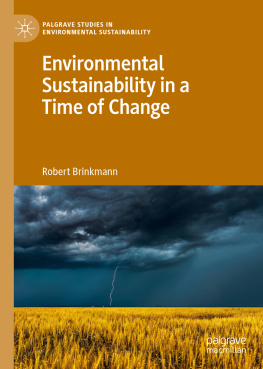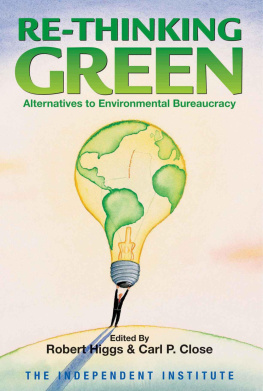ENVIRONMENTAL MANAGEMENT
The field of environmental management (EM) involves a broad and evolving repertoire of practices. The field originated around 1970 in response to new policy, regulation and public concern about environmental issues. EM has undergone many changes and improvements since then, progressing from a reactive, compliancebased focus towards, in leading cases, practices reflecting strong commitment to sustainability. And yet, EM remains, for the most part, ill-equipped to deal with the complex and highly uncertain implications of the ecological crisis.
Environmental Management offers a rigorous critique of conventional EM and explores alternative ideas, frameworks and approaches that are currently considered fringe, but which have the potential to transform the practice of EM. This book goes beyond narrow definitions and considers questions regarding the purpose, roles, scope and potential of environmental management. EM is situated and contextualized within the evolving and expanding realm of environment and sustainability literature. The book argues that new approaches to EM need to be more flexible, imaginative and better equipped to address future environmental problems of a scale and severity previously unforeseen.
This book will be of great interest to students and scholars of environmental management, environmental planning, resource management, and environmental assessment.
Peter R. Mulvihill is Professor in the Faculty of Environmental Studies, York University, Canada.
S. Harris Ali is Professor in the Faculty of Environmental Studies and the Graduate Program Director of Sociology, York University, Canada.
This very timely, detailed and provocative book provides a much-needed critical perspective on environmental management and alternative approaches to future practice. It opens up the intellectual space for debate and fruitful thinking through the integration of insights ranging from disaster management to black swan thinkingassessing and reorienting these into cogent principles for alternative EM.
John Sinclair, Professor, Natural Resources Institute, University of Manitoba, Canada
I have been waiting for a book like this. An up-to-date and comprehensive overview of the field of environmental management; one with the right balance of theory, practice and connections to the real world. Key concepts and ideas are well defined in terms that are clear and intelligent. This book understands the very ephemeral nature of environmental management; a realm responsive and reactive to shifting natural, social and economic conditions shaped by politics, the public, and the realities of our worlds changing environment. An excellent work for senior undergraduate or graduate courses in environmental management, policy and history.
Kevin Hanna, Director, Centre for Environmental Assessment Research, The University of British Columbia, Canada
In this engaging and informative text, Mulvihill and Ali present a comprehensive overview of emerging debates in environmental management. Their rigorous analysis of the fields history, nuanced examination of socio-ecological approaches, and timely call for a re-orientation in environmental thinking will appeal to emerging scholars and established practitioners alike.
Roza Tchoukaleyska, Assistant Professor, Environmental Studies, Grenfell Campus, Memorial University, Canada
This thoughtful and thought-provoking book can help transform environmental management to more effectively anticipate and respond to contemporary and emerging environmental crises and challenges. It provides a systematic overview of current practice, draws upon an array of pertinent theory and research, and refines and integrates a host of alternative frameworks, concepts and models.
David P. Lawrence, Ph.D., Lawrence Environmental, USA
First published 2017
by Routledge
2 Park Square, Milton Park, Abingdon, Oxon OX14 4RN
and by Routledge
711 Third Avenue, New York, NY 10017
Routledge is an imprint of the Taylor & Francis Group, an informa business
2017 Peter R. Mulvihill & S. Harris Ali
The right of Peter R. Mulvihill & S. Harris Ali to be identified as authors of this work has been asserted by them in accordance with sections 77 and 78 of the Copyright, Designs and Patents Act 1988.
All rights reserved. No part of this book may be reprinted or reproduced or utilized in any form or by any electronic, mechanical, or other means, now known or hereafter invented, including photocopying and recording, or in any information storage or retrieval system, without permission in writing from the publishers.
Trademark notice: Product or corporate names may be trademarks or registered trademarks, and are used only for identification and explanation without intent to infringe.
British Library Cataloguing-in-Publication Data
A catalogue record for this book is available from the British Library
Library of Congress Cataloging-in-Publication Data
Names: Mulvihill, Peter R., author. | Ali, S. Harris, author.
Title: Environmental management : critical thinking and emerging practices /
Peter R. Mulvihill & S. Harris Ali.
Description: New York, NY : Routledge, 2016.
Identifiers: LCCN 2016027216| ISBN 9781138899933 (hb) |
ISBN 9781138899964 (pb) | ISBN 9781315707570 (ebk)
Subjects: LCSH: Environmental management. | Environmental
managementMethodology.
Classification: LCC GE300 .M85 2016 | DDC 363.7dc23
LC record available at https://lccn.loc.gov/2016027216
ISBN: 978-1-138-89993-3 (hbk)
ISBN: 978-1-138-89996-4 (pbk)
ISBN: 978-1-315-70757-0 (ebk)
Typeset in Bembo and Stone Sans
by Florence Production Ltd, Stoodleigh, Devon, UK
We wish to thank the team at RoutledgeEarthscan for their invaluable editorial help.
Thanks to Dean Ray for assisting with sections of the manuscript preparation.
Thanks to five anonymous reviewers for their thoughtful and helpful comments.
To the numerous environmental management practitioners as well as the environmental and disaster sociologists who we have learned from over the years, many thanks for sharing your insights.
Special thanks to our families for their love and support.
ANT Actor Network Theory
Corp United States Army Corp of Engineers
CSR corporate social responsibility
EIA environmental impact assessment
EM environmental management
EMS environmental management system
ENGO environmental non-government organization
IFRC International Federation of Red Cross and Red Crescent Societies
IPCC Intergovernmental Panel on Climate Change
ISO Inter Organization for Standardization
LED light-emitting diode
NSF National Science Foundation
NEP New Ecological Paradigm
NGO non-government organization
RM resource management
UN United Nations
UNISDR United Nations International Strategy for Disaster Reduction

